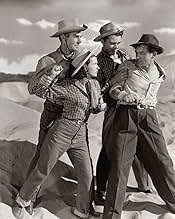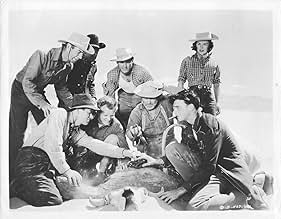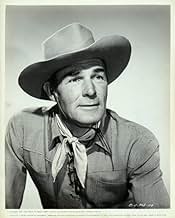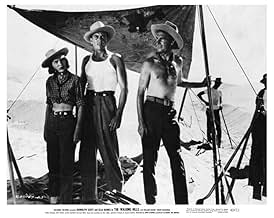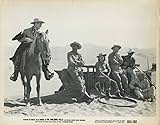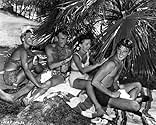VALUTAZIONE IMDb
6,4/10
1222
LA TUA VALUTAZIONE
Aggiungi una trama nella tua linguaA group of treasure hunters search for a wagon load of gold, buried years before in Death Valley.A group of treasure hunters search for a wagon load of gold, buried years before in Death Valley.A group of treasure hunters search for a wagon load of gold, buried years before in Death Valley.
- Regia
- Sceneggiatura
- Star
Ralph Dunn
- Detective
- (non citato nei titoli originali)
Ray Jones
- Rodeo Spectator
- (non citato nei titoli originali)
John McKee
- Bronc Handler
- (non citato nei titoli originali)
Frank Merlo
- Bronc Handler
- (non citato nei titoli originali)
Jack Parker
- American Customs Guard
- (non citato nei titoli originali)
Charles Stevens
- Cleve
- (non citato nei titoli originali)
Frank Yaconelli
- Bartender
- (non citato nei titoli originali)
Recensioni in evidenza
John Sturges, later to direct The Magnificent Seven and Bad Day at Black Rock, does extremely well with this little sleeper about modern day westerners hunting for a lost gold caravan in the California desert. William Bishop isn't bad as the honest murder fugitive, and John Ireland and Arthur Kennedy are strong as usual as a couple of not-very-ethical types. Randolph Scott gets to play some interesting notes here as a horse rancher caught up in the hunt, and the supporting parts are all well played. The sandstorm in the last act is really terrifically exciting, and speaking as one who's filmed during a sandstorm, it's hard to believe the stars put up with filming such a long sequence in those conditions. My hat's off to them and to Sturges for a fine little movie, written by Alan Le May (of The Searchers and The Unforgiven fame).
Excellent western ,where what is apparently the main subject (the search for gold) is actually of secondary importance in the end.The director is much more interested in his characters and the relationships that are formed between them.He superbly films the desert ,which has got something lunar ,disturbing ;the signals in the distance increases this feeling of mystery.Even the flashbacks are strange ,they seem completely out of place (Ella Raines could have told her story ) and they add to the threatening atmosphere.Most of the time,the viewer does not know who is searching who and almost all the action takes place in the same place (apart from the beginning) ,which is very rare in a western.Impressive sand-storm scene.
We have been seeing this on the TV Westerns channel. It's a very film noir western. Beside the always sturdy and moral Randolph Scott, there were two special delights. Ella Raines is my long favorite among the older actresses, with her bright eyes and rather sarcastic manner always seeming to be laughing at some private joke. I feel a personal connection to her in that she was born a month after my father and followed him by a month in death. She first captured my fascination in "The Suspect" with Charles Laughton and then in "The Strange Affair of Uncle Harry" with George Sanders. Josh White is the really special feature here. How often do you find such wonderfully played Delta Blues inexplicably inserted into the plot of a 1949 western? It's not a truly great movie but still a must-see because it is so ahead of it's time. "Bad Day at Black Rock" meets "O Brother Where Art Thou."
A nice little western drama from the early part of director John Sturges' career. Simple and straight to the point screenplay from Alan Le May. Randolph Scott leads a group of treasure hunters into the whispering, shifting sands of Death Valley's "walking hills". There's a wagon load of gold waiting to be found in the desert. Top notch camera work and a very good cast that also features: Edgar Buchanan, Arthur Kennedy, John Ireland and Ella Raines. Scott as usual is stoic and commanding. Seventy-eight minute escape.
A very rewarding "lust for gold" adventure that tells its story in a brief 78 minutes and is all the better for it. Director John Sturges would later in his career allow some of his films to run overlong (THE GREAT ESCAPE) or blow up what should have been more simply told (GUNFIGHT AT THE OK CORRAL - the depicted gunfight itself is but one example), but earlier in his career made a number of lean, taut treasures, this is one of them.
A group of people are bound together in the search for some wagons believed to have been lost in the desert a century earlier, and the legend has it that gold was on them. When the youngest of them happens to mention something spotted in the desert, the need for secrecy binds the group together lest someone reveal the "golden opportunity." Several in the group have pasts that they are trying to hide and potential futures they are trying to escape if caught. One of them is a detective hot on a fugitive's trail, but willing to set aside duty for his share of the loot.
Randolph Scott headlines as the more or less moral center of the group, even if his intentions and actions seem to defy that description. For a slightly less than "A" feature, the film boasts an admirable cast of characters, among them Ella Raines, John Ireland, Arthur Kennedy, Edgar Buchanan (scene stealing as usual) and blues/folk revivalist singer Josh White whose musical contributions to the film capture a legendary performer for posterity. William Bishop, a young man whom Columbia was grooming for stardom (but who failed to click and would soon "descend" to mostly TV work) is the least familiar perhaps of the major actors, but he's impressive enough here for one to wish he had done better within the ten years that he had left before cancer took him at 41.
An interesting subplot has Scott's mare about to foal - a metaphor for new life or spiritual rebirth being created among the desert ruins. It gives nothing away to reveal that the fugitive surrenders or that some characters realize that gold fever can cause one to suspend principles - the latter is expected in such melodramas. But with its stunning black-and-white cinematography, especially in night scenes and the climatic desert storm, this film is as much of a treasure as that which its protagonists seek. Camera ace Charles Lawton must have impressed Scott and producer Harry Joe Brown as he would do five more films with the pair in the next decade. Highly recommended.
A group of people are bound together in the search for some wagons believed to have been lost in the desert a century earlier, and the legend has it that gold was on them. When the youngest of them happens to mention something spotted in the desert, the need for secrecy binds the group together lest someone reveal the "golden opportunity." Several in the group have pasts that they are trying to hide and potential futures they are trying to escape if caught. One of them is a detective hot on a fugitive's trail, but willing to set aside duty for his share of the loot.
Randolph Scott headlines as the more or less moral center of the group, even if his intentions and actions seem to defy that description. For a slightly less than "A" feature, the film boasts an admirable cast of characters, among them Ella Raines, John Ireland, Arthur Kennedy, Edgar Buchanan (scene stealing as usual) and blues/folk revivalist singer Josh White whose musical contributions to the film capture a legendary performer for posterity. William Bishop, a young man whom Columbia was grooming for stardom (but who failed to click and would soon "descend" to mostly TV work) is the least familiar perhaps of the major actors, but he's impressive enough here for one to wish he had done better within the ten years that he had left before cancer took him at 41.
An interesting subplot has Scott's mare about to foal - a metaphor for new life or spiritual rebirth being created among the desert ruins. It gives nothing away to reveal that the fugitive surrenders or that some characters realize that gold fever can cause one to suspend principles - the latter is expected in such melodramas. But with its stunning black-and-white cinematography, especially in night scenes and the climatic desert storm, this film is as much of a treasure as that which its protagonists seek. Camera ace Charles Lawton must have impressed Scott and producer Harry Joe Brown as he would do five more films with the pair in the next decade. Highly recommended.
Lo sapevi?
- BlooperAt the end of the picture, just before Ella Raines rides off, she calls Randolph Scott, "Jeff", only his character's name is "Jim".
- Citazioni
Chris Jackson: [Referring to the large bandage on her forehead] Yeah, until I went bangin' my puss! Now get lost, will ya?
- Colonne sonoreYou Won't Let Me Go
Sung by Josh White
I più visti
Accedi per valutare e creare un elenco di titoli salvati per ottenere consigli personalizzati
- How long is The Walking Hills?Powered by Alexa
Dettagli
- Tempo di esecuzione
- 1h 18min(78 min)
- Proporzioni
- 1.37 : 1
Contribuisci a questa pagina
Suggerisci una modifica o aggiungi i contenuti mancanti

